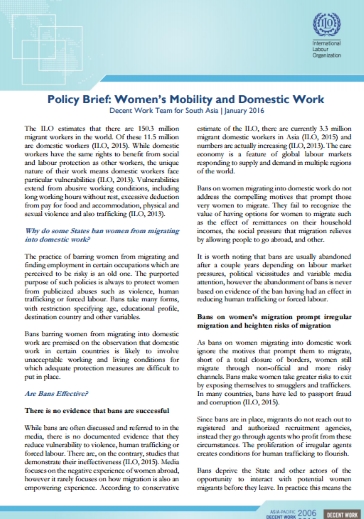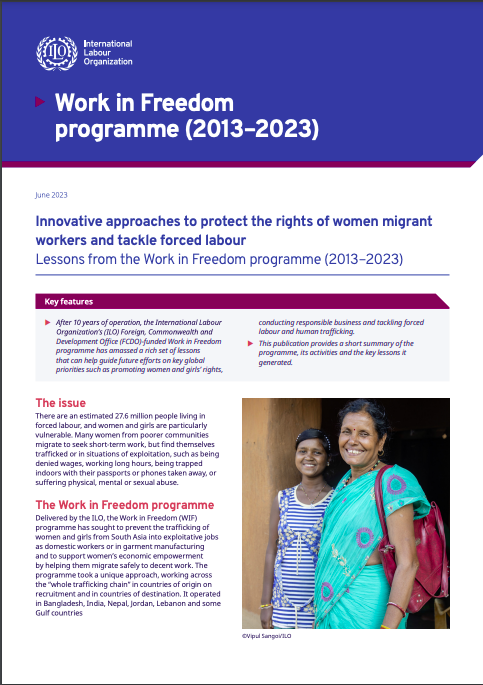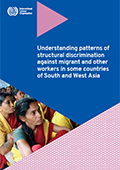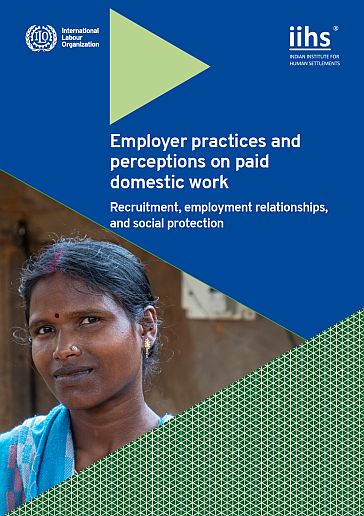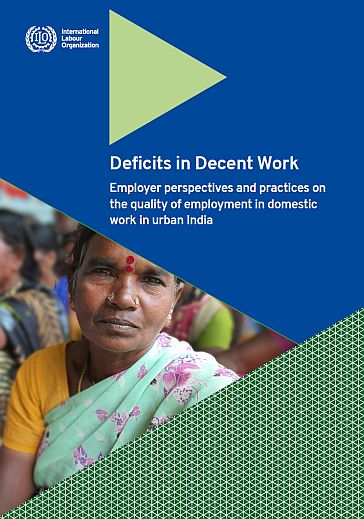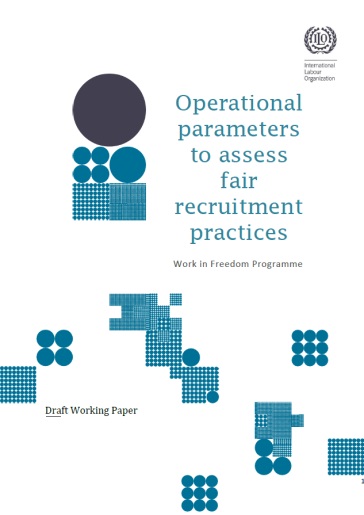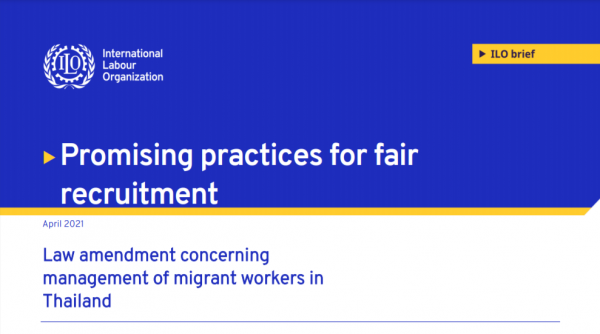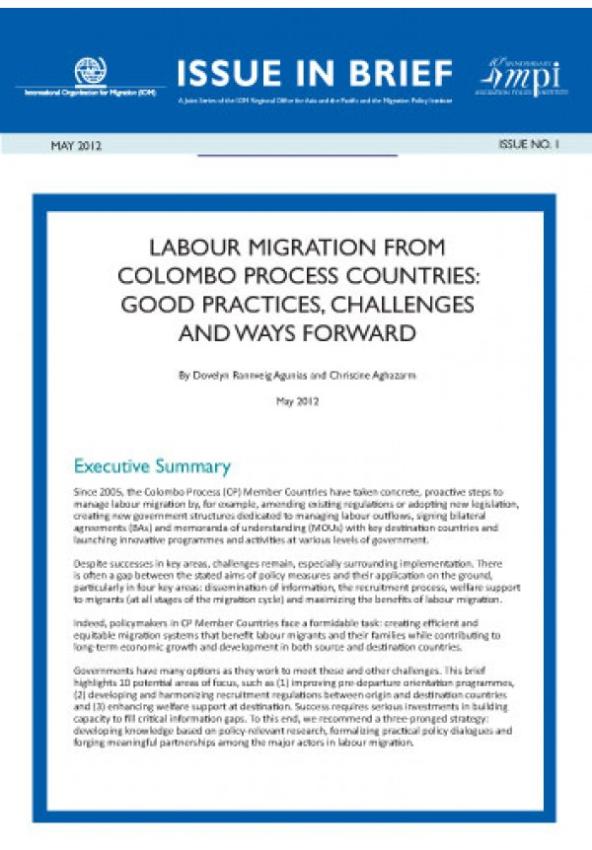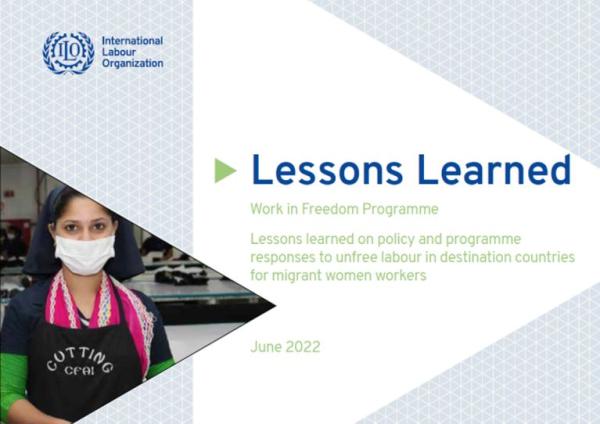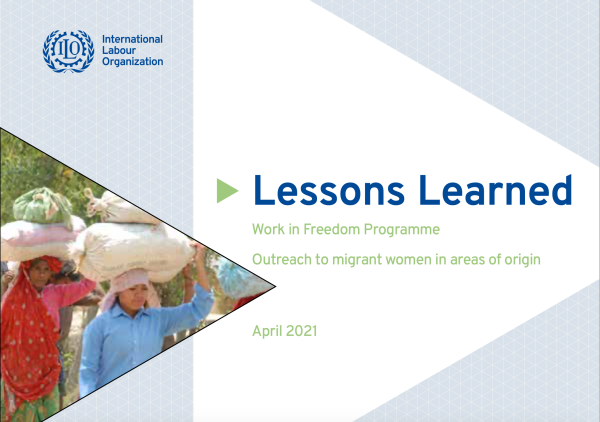Policy Brief: Women’s Mobility and Domestic Work
The ILO estimates that there are 150.3 million migrant workers in the world. Of these 11.5 million are domestic workers (ILO, 2015).
Type of document :
Country/Region :
Year of publication :
Theme : , ,
Innovative approaches to protect the rights of women migrant workers and tackle forced labour: Lessons from the Work in Freedom programme (2013–23)
This brief provides a short summary of the Work in Freedom programme outreach and activities conducted to tackle forced labour and trafficking with the key lessons it generated over the ten-year period (2013-23) of its implementation.
After 10 years of operation, the International Labour Organization’s (ILO) and Foreign, Commonwealth and Development Office (FCDO)-funded Work in Freedom programme has amassed a rich set of lessons that can help guide future efforts on key global priorities such as promoting women and girls’ rights conducting responsible business and tackling forced labour and human trafficking. This brief provides a short summary of the Work in Freedom programme, its activities and the key lessons it generated.
Type of document :
Country/Region :
Year of publication :
Theme : , , ,
Understanding patterns of structural discrimination of migrant and other workers in some countries of South and West Asia
This background paper reviews the literature that sheds light on the structural patterns of discrimination against migrant workers in some countries of South and West Asia. It also articulates recommendations that would help officials in UN agencies, international organizations, constituents and other civil society individuals and groups, while referring to the existing evidence of structural discrimination to support the application of international labour standards.
While references to international non-discrimination standards do occasionally surface in public discourses, this paper reviews evidence that discrimination in the world of work is not only characterized by socially deviant cases of discriminatory abuse, as reported in the media, but is rather intrinsic to the way various market economies and political systems are structured. This is manifested by indicators of privilege for some and indicators of deprivation for those at the bottom of the social and political hierarchies, including the interaction between both.
Type of document :
Country/Region : , , , , , , ,
Year of publication :
Theme : , , , , ,
Employer practices and perceptions on paid domestic work: Recruitment, employment relationships, and social protection
This study report is an important contribution towards understanding employers’ perceptions, rationale and bases that underlie how employers in urban India engage, value, and perceive domestic work.
To do so, it draws upon data from personal interviews with 403 households in two large metropolitan Indian cities– Bengaluru and Chennai – with variations across socio-economic status, caste, neighborhood type and across households with and without women working for wages. This report is the third of a three-part series, with the first report looking at paid and unpaid hours taken to reproduce a household in urban India, and the second report looking at the quality of employment for paid domestic workers.
Type of document :
Country/Region :
Year of publication :
Theme : , ,
Deficits in decent work: Employer perspectives and practices on the quality of employment in domestic work in urban India
This study report contributes towards understanding employers’ perspectives on existing working conditions and practices relating to recruitment, income security, employment security and social security available to domestic workers.
To do so, this report draws upon data from 3,067 households in two large metropolitan Indian cities – Bengaluru and Chennai – with variations across socio-economic status, caste, religion, neighborhood type and across households with and without women working for wages. This report is the second of a three-part series, with the first report looking at the total number of paid and unpaid hours it takes to reproduce a household in urban India, and the third assessing employer motivations, beliefs and perspectives about domestic work and workers.
Type of document :
Country/Region :
Year of publication :
Theme : , ,
Working Paper on Operational Parameters to Assess Fair Recruitment Practices
These parameters list a series of questions and issues that should be looked into in order to assess recruitment practices.
In South Asia, the pathways to jobs in domestic, garment or other similar sectors within the region or to the Middle East are intersected by various agents or contractors in an environment shaped by multiple rules and practices determining the mobility of aspiring workers especially women. The fluidity and segmentation of labour supply chains and labour regimes are such that none of the key stakeholders such as labour recruiters, regulators and even employers can guarante on their own a fair migration outcome for any workers. To do so requires understanding the specificity of recruitment processes from end to end and strong multi-stakeholder cooperation. The purpose of these operational parameters is to identify the main fields that need to be assessed and related questions when analyzing recruitment processes.
Type of document :
Country/Region : , , , ,
Year of publication :
Theme : , , ,
Promising practices for fair recruitment
This list presents a series of promising fair recruitment practices and results from a stocktaking exercise undertaken five years after the launch of the Fair Recruitment Initiative (FRI).
Establishment of the National Union of Malagasy Domestic Workers (SENAMAMA)
Code of Conduct for Ethiopian Overseas Private Employment Agencies
Recruitment of health workers through bilateral labour agreements (BLAs): Kenya and the United Kingdom
Madagascar alignment of labour code to newly ratified conventions
Regulation of Private Recruitment Agencies in Uganda
Law amendment concerning management of migrant workers in Thailand
Revision of the Law on Contract-Based Overseas Workers
Italian National Action Plan to tackle labour exploitation, unlawful recruitment and forced labour in agriculture
Nepal – Bilateral labour agreements include provisions related to fair recruitment
Bangladesh – Government capacity enhanced to promote fair recruitment in bilateral negotiations and arrangements
Tunisia – Formation of a new body of inspectors for the recruitment industry
India – Blacklisting employers and recruiters abroad to protect Indian migrant workers
Piloting fair recruitment from Bangladesh to Qatar in the construction sector
Fair recruitment pilot between Nepal and Jordan in the garment sector
Mexico - Fair recruitment practice by recruitment agency adapted to COVID-19
Code of Conduct on the fair recruitment of Filipino migrant domestic workers in Hong Kong (China)
Code of Conduct in international supply chains by Responsible Business Alliance
Commitment to fair recruitment and due diligence in the sugar and palm oil industry of Guatemala (English) Guatemala – Compromiso con la contratación equitativa y la debida diligencia en el sector guatemalteco del azúcar y el aceite de palma (Español)
Zero recruitment fee policy for (migrant) workers in Jordan
Guatemala – Outreach through trade unions including attention to COVID-19 (English) Guatemala – Difusión a través de los sindicatos, incluida la atención a la COVID-19 (Español)
Raising Pakistani migrant worker’s awareness of their right to fair recruitment
Type of document :
Country/Region : , , , , , , , , , , , ,
Year of publication :
Theme : , , , ,
IOM-MPI Issue in Brief No. 1 - Labour Migration from Colombo Process Countries: Good practices, challenges and ways forward
International migration has occurred throughout history and regions of the world. Human mobility to, from and within Asia, however, has certain distinctive features, and Asia represents arguably the most dynamic region, with significant intra- and extra-regional migration and some countries being simultaneously origins of and destinations for migrants.
The Migration Policy Institute (MPI) and the International Organization for Migration (IOM) Regional Office for Asia and the Pacific today launched an issue briefs series focusing in particular on labour migration in the region. The eight-part series also will examine diaspora engagement in Asia and climate-induced migration.
The first issue brief, Labour Migration from the Colombo Process Countries, examines labour migration from the 11 Colombo Process countries (Afghanistan, Bangladesh, China, India, Indonesia, Nepal, Pakistan, the Philippines, Sri Lanka, Thailand and Viet Nam). In 2010, an estimated 4.2 million workers migrated from these countries through official channels, many leaving on a temporary basis to work in the Middle East.
The Philippines sent the largest number (nearly 1.5 million), followed by India (641,000) and Indonesia (576,000). Overall, an estimated 44.7 million migrants from the region are living outside their country of origin.
Since 2005, the Colombo Process countries have taken concrete, proactive steps to manage the migration flows and protect their citizens working abroad, strengthening their legislative and administrative frameworks addressing recruitment regulation and welfare protection, as well as signing new accords with key destination countries. Despite the progress, however, the brief details a number of remaining challenges and highlights 10 possible areas of focus for governments.
“Governments in Colombo Process countries face a formidable task: creating efficient and equitable migration systems that benefit labour migrants and their families while contributing to long-term economic growth and development in countries of origin and destination,” said Andy Bruce, IOM regional director for Asia and the Pacific.
In June, IOM and MPI will publish the second issue brief, this one focusing on migrant health issues in the Asia-Pacific region. Subsequent briefs will be published every month through December, and will be available at IOM Online Bookstore and Migration Policy Institute.
Type of document :
Country/Region : , , , , , , , , , , ,
Year of publication :
Theme : , ,
Lessons Learned Part 3: Policy and programme responses to unfree labour in destination countries for migrant women workers
This document describes the lessons learned by the Work in Freedom programme on policy and programme responses to unfree labour in destination countries for migrant women workers. This compilation was preceded by an earlier edition of Lessons Learned in October 2021 on recruitment of migrant workers, and another one in April 2021, on outreach to migrant women in areas of origin. It documents the lessons learned by the Work in Freedom Programme regarding policy and programme responses to unfree labour in destination countries for migrant women workers.
Type of document :
Country/Region : ,
Year of publication :
Theme : , ,
Lessons Learned Part 1: Outreach to migrant women in areas of origin
This document describes the lessons learned by the Work in Freedom programme on outreach to migrant women in areas where they migrate from. This compilation was preceded by an earlier edition of Lessons Learned in October 2017, followed by another one in February 2019. The findings are important to inform Governments, donors and civil society groups on their policies regarding the protection of migrant women, safe migration, pre-departure training and orientation and more.
Type of document :
Country/Region : , , , , , ,
Year of publication :
Theme : , ,
Subscribe to the Fair Recruitment Initiative Newsletter
Sign up to receive news delivered to your inbox.

